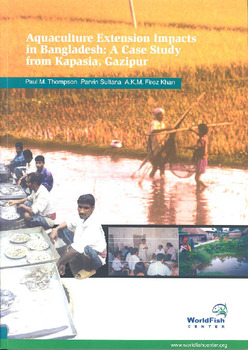Aquaculture extension impacts in Bangladesh: a case study from Kapasia, Gazipur

Citation
Thompson, P.M.; Sultana, P.; Firoz Khan, A.K.M. (2005). Aquaculture extension impacts in Bangladesh: a case study from Kapasia, Gazipur. WorldFish Center Tech. Rep. (63): 75 p.
With many ponds and high demand for fish, Bangladesh has a high potential for aquaculture . Since the 1980s, there have been many aquaculture extension projects. As a result, pond aquaculture production is estimated to have trebled between approximately 1990 and 2000, and is currently estimated to be in order of 750 000 t per year. This gave an ideal opportunity to understand the impacts of aquaculture extension. This study investigated the practices and performance of farmers about six years after specific extension efforts had ended, in order to gain a better understanding of the sustained practices and benefits achieved by fish farmers from extension. It followed up an earlier project in Kapasia Upazila (subdistrict) in Gazipur District north of the capital Dhaka, where the WorldFish Center with funding from the International Fund for Agricultural Development (IFAD) and the Danish International Development Agency (Danida), had researched on farming systems and had introduced adaptive integrated aquaculture practices. Surveys were undertake to compare the aquaculture systems with baseline and project period data.
Permalink
Date Available
Type
Publisher
Countries
Copyright
CC BY 4.0
Research Themes
Topics
Language